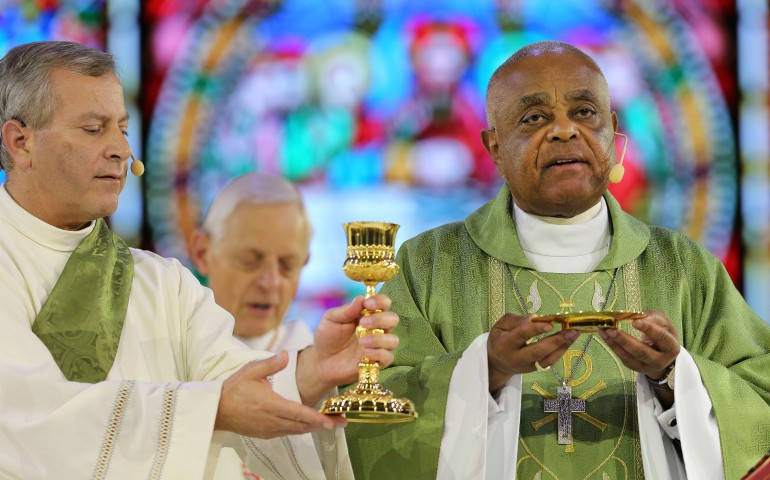
Atlanta Archbishop Wilton D. Gregory, right, Concelebrates Mass during the "Convocation of Catholic Leaders: The Joy of the Gospel in America" July 2 in Orlando, Fla. (CNS photo/Bob Roller)
Bishops should look at ways to help verify and guarantee the validity and worthiness of the bread and wine used for the celebration of the Eucharist, the Vatican said in a recent document.
Because bread and wine for the Eucharist are no longer supplied just by religious communities, but "are also sold in supermarkets and other stores and even over the internet," bishops should set up guidelines, an oversight body and/or even a form of certification to help "remove any doubt about the validity of the matter for the Eucharist," the Vatican's Congregation for Divine Worship and the Sacraments said.
The recommendations came in a circular letter, "On the bread and wine for the Eucharist," sent to diocesan bishops "at the request of the Holy Father, Pope Francis." Dated June 15 — the feast of the Body and Blood of Christ — the letter was made public by the Vatican July 8. The letter was signed by Cardinal Robert Sarah, congregation prefect, and Archbishop Arthur Roche, secretary.
Because the church requires certainty regarding the conditions necessary for the validity of the sacraments, the congregation offered some suggestions so that bishops can continue to "watch over the quality of the bread and wine" as well as "those who prepare these materials."
The congregation underlined that every bishop "is bound to remind priests, especially parish priests and rectors of churches, of their responsibility to verify those who provide the bread and wine for the celebration and the worthiness of the material."
Bishops must also provide information to the producers of the bread and wine for the Eucharist and to remind them of the absolute respect that is due to the norms," it said. Producers "must be aware that their work is directed toward the eucharistic sacrifice and that this demands their honesty, responsibility and competence," it added.
The congregation suggested ordinaries offer guidance, for example, by "guaranteeing the eucharistic matter through special certification."
Bishops may want to agree on and establish "concrete regulations" on the national level through their bishops' conferences, it suggested.
"Given the complexity of situations and circumstances, such as a decrease in respect for the sacred, it may be useful to mandate a competent authority to have oversight in actually guaranteeing the genuineness of the eucharistic matter by producers as well as those responsible for its distribution and sale," the Vatican congregation wrote.
A competent authority, for example, could be "one or more religious congregations or another body capable of carrying out the necessary checks on production, conservation and sale of the eucharistic bread and wine in a given country and for other countries to which they are exported," it wrote.
The letter also reiterated norms already in place regarding eucharistic matter:
- "The bread used in the celebration of the most holy eucharistic sacrifice must be unleavened, purely of wheat, and recently made so that there is no danger of decomposition."
- Bread made from another substance, even grain or mixed with another substance so different from wheat that it would not commonly be considered wheat bread, "does not constitute valid matter."
- The introduction of any other substances, "such as fruit or sugar or honey, into the bread for confecting the Eucharist," it said, "is a grave abuse."
- Low-gluten hosts are valid matter for people who, "for varying and grave reasons, cannot consume bread made in the usual manner," provided the hosts "contain a sufficient amount of gluten to obtain the confection of bread without the addition of foreign materials and without the use of procedures that would alter the nature of bread."
- Completely gluten-free hosts continue to be "invalid matter for the celebration of the Eucharist."
- Wine used in the celebration of the eucharistic "must be natural, from the fruit of the grape, pure and incorrupt, not mixed with other substances," well conserved and have not soured.
- "It is altogether forbidden to use wine of doubtful authenticity or provenance."
- No other drinks of any kind may not be admitted "for any reason, as they do not constitute valid matter."
- For people who, "for varying and grave reasons," cannot consume wine fermented in the normal manner, "mustum" is valid matter for the celebration of the Eucharist. Mustum is grape juice that is either fresh or preserved by methods that suspend its fermentation without altering its nature, for example, by freezing.
- Eucharistic matter made with genetically modified organisms can be considered valid matter.
- Permission must be given by the ordinary for an individual priest or layperson to use low-gluten hosts or mustum for the celebration of the Eucharist. "Permission can be granted habitually, for as long as the situation continues which occasioned the granting of permission."
People who live with celiac disease are unable to digest gluten, a type of protein commonly found in grains such as rye, barley and wheat. There also are people who live with nonceliac gluten intolerance or gluten sensitivity whose health can be adversely affected by gluten.
The U.S. bishops' Committee on Divine Worship has said Catholics who cannot receive Communion wafers at all, even under the species of low-gluten hosts, "may receive Holy Communion under the species of wine only." The church teaches that "under either species of bread or wine, the whole Christ is received," it said.
Medical certification of a condition justifying the use of mustum or low-gluten hosts for Communion is not required, the committee said.



